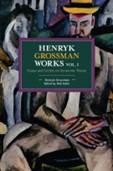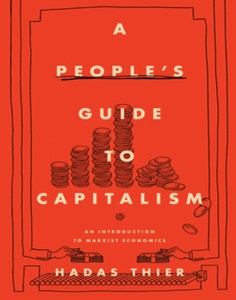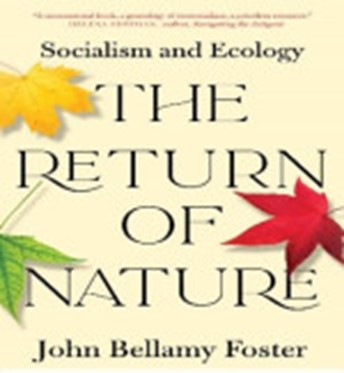By Michael Roberts
Every year, I do a post on books that I have reviewed during the last 12 months. What’s a bit surprising in this year of the COVID is that I did not review any books specifically on the pandemic. Even the excellent book by John Bellamy Foster, The Return of Nature: Socialism and Ecology, which won this year’s Deutscher Memorial Prize, did not cover the impact of the coronavirus.
That was not its purpose, of course. Instead, Foster aims to show the close connection between socialism and ecology and, in particular, how Marx and Engels were always sensitive to the destructive impact of capitalism on nature as well as on labour (and it would appear in response, ‘nature’s revenge’, as Engels put it).
So what did I review? Let me start with what I consider was the best book of the year. This year it is a dead heat between two, in my view. The first is Henryk Grossman, Capitalism’s contradictions: studies in economic theory before and after Marx, edited by Rick Kuhn and published by Haymarket Books. Kuhn brings together essays and articles by Grossman that include an analysis of the economic theories of the Swiss political economist Simonde de Sismonde, who exercised a powerful influence on the early socialists who preceded Marx. And there is a critical essay by Grossman on all the various ideas and theories presented by Marx’s epigones from the 1880s onwards.

Grossman, in my view, made major contributions in explaining and developing Marx’s theory of value and crises under capitalism. He put value theory and Marx’s laws of accumulation and profitability at the centre of the cause of recurrent and regular crises under capitalism. He emphasised that the production of value is the driving force behind the contradictions in capitalism, not its circulation or distribution, even though these are an integral part of the circuit of capital, or value in motion. This issue of the role of production retains even more relevance in debates on the relevant laws of motion of capitalism today, given the development of ‘financialisation’ and the apparent slumber of industrial proletariat.
While the Grossman book gives the reader a deeper understanding of Marxist political economy, equally great for me this year was the excellent attempt to introduce Marx’s economic analysis in a popular way by Hadas Thier in her People’s Guide to Capitalism, also published by Haymarket Books.

Thier provides a clear, straightforward and entertaining explanation of all Marx’s basic theoretical insights into the nature and development of capitalism. And she uses modern examples that help the reader to understand why Marxist political economy is so clinical in its analysis of the reality of modern capitalist economies. The book can be regularly turned to in order to understand the waste, destruction and misery caused by the modern capitalist system of exploitation.
There are three other books with a Marxist perspective that I reviewed in 2020. The concept of ‘monopoly’ is often talked about in political economy as a relevant category for modern capitalism. We don’t usually recognise ‘monopsony capitalism’. But we should. This is where Ashok Kumar’s book, Monopsony Capitalism Power and Production in the Twilight of the Sweatshop Age fills a gap.

Kumar argues the monopsony power of the multi-national retailers in the ‘global north’ is now increasingly being challenged by oligopolistic suppliers in the ‘global south’, driven by their workforces to demand better prices and terms. This is altering the balance of economic power. Suppliers in the global south are gaining strength against monopsony buyers in the north. Kumar suggests that this could mean the end of the ‘sweatshop age’, although “that may ultimately depend on the self-organization and demands of the working people.”
Marx describes towards the end of Capital,“If money comes into the world with a congenital blood-stain on one cheek,” then “capital comes dripping from head to toe, from every pore, with blood and dirt.” Blood and Money is the theme of a new book by David McNally, the Marxist Professor of History at the University of Houston.
Blood and Money tells the story of money (the medium of capitalist exchange) as a history of violence and human bondage. McNally reckons money’s emergence and its transformation are intimately connected to the buying and selling of slaves and the waging of war. McNally’s argument has the ring of historic truth, but in my view, the emergence of money must still be seen as the product of exchange, not war or slavery. Indeed, modern capitalism (now without slavery, mostly) is even more exploitive of human labour power and bodies.
Back in Europe, in his new book, Sellouts in the Room, Eric Toussaint reviewed the events of the Greek debt crisis from 2012-15. At the beginning of 2015, the Greek people elected the left-wing Syriza party to power. Syriza pledged to resist austerity measures. The new leftist prime minister Tsipras appointed the already well-known economist Yanis Varoufakis as finance minister to negotiate a deal with the Troika. In the summer of 2015, the Greek people voted 60% to reject the Troika plan. But immediately after the vote, Tsipras caved into the Troika and agreed to their demands. Varoufakis resigned as finance minister and later wrote an account of his negotiations with the Troika, called Adults in the Room.
Toussaint was also in Greece at the time coordinating the work of a debt audit committee set up by the president of the Hellenic Parliament in 2015 to look at the nature of the debt that the Greeks owed to the likes of European banks, hedge funds and other governments. In his book, Toussaint offers an alternative view of those events from that recounted by Varoufakis. I have written a foreword to the English version. It amounts to a devastating critique of the Syriza government and of Varoufakis’ strategy and tactics during 2015. It’s a painful but necessary read.
Books with a Marxist perspective, of course, received much less acclaim and publicity than those from a Keynesian or post-Keynesian bent. This year, the most popular among radical circles in America was The Deficit Myth by Stephanie Kelton, former adviser to leftist Bernie Sanders and the most prominent promoter of Modern Monetary Theory (MMT). In her book, Kelton says that the argument of the ‘Austerians’ that governments must ‘balance their books’ is a myth because the national governments control the unit of national currency, so the state can just digitally ‘print’ the money it needs to spend. Indeed, that is what is happening right now during the COVID-19 pandemic, the argument goes.
On my blog and elsewhere, I have analysed critically the arguments of MMT. MMT has no concept of the law of value in capitalist economies, namely that production is for profit not social need; production is for exchange value, not use value; based on the exploitation in production, not on the creation of money for taxation. Profit does not touch the sides of MMT. And here the real issue is exposed. How does a capitalist economy expand capacity, investment and production? Why are there regular and recurring slumps in capitalist economies?
These questions are not dealt with or answered by MMT. It may be a myth that governments cannot run deficits and need to ‘balance the books’. But it is also an illusion to reckon that the crisis-prone nature of capitalist production can be ‘managed’ by means of ‘money artistry’, that is, by the manipulation of money, credit and government deficits. That’s because the structural causes of capitalist crises lie not in the monetary sector or the fiscal sector, but in the system of globalized capitalist production.
The other Keynesian book that received wide acclaim in 2020 was Trade wars are class wars by Matthew Klein and Michael Pettis. Klein and Pettis argue that the origin of the trade war between the US and China is rising inequality which has weakened aggregate demand; and a global ‘savings glut’ generated by countries like Germany and China. This has created huge global imbalances in demand and supply that threaten economic crises, increased protectionist rivalry and international peace.
This is a straightforward underconsumption theory of crises, much cruder than even Keynes. Consumption is not the only category of ‘aggregate demand’; there is also investment demand by capitalists. There has been an investment dearth not a savings glut, caused by declining profitability of capital in the major capitalist economies. The ‘class war’ that Klein and Pettis argue is the cause of trade wars should be related to the exploitation of labour by capital for higher profitability, not a lack of domestic consumption caused by low wages.
For Klein and Pettis, their ‘class war’ is between ‘bankers’ and ‘households’, not capital and labour. And the coming imperialist trade wars are between ‘excess savers’ (China and Germany) and excess consumers (US and UK), not between rival imperialist powers over the share of profits extracted from labour globally. Indeed, Klein and Pettis end up positioning US imperialism as a ‘victim’ of Asian and German economic policy!
We get a similar approach to Klein and Pettis in a book by Michael Howell, called Capital Wars. But Howell sees that the battle between the US and China taking place on the financial plane; not so much through trade or technology, but through financial flows and the control of international currencies. There is clearly some truth in this. If China were able to offer a strong and liquid currency to replace the dollar, US imperialism would be in serious trouble. But a strong currency cannot be ‘created’ by financial markets; it comes from the relative strength of the productivity of labour and value creation in an economy. That is where the economic war is centred; with trade, technology and finance being the battlegrounds. But value decides, not credit.
During the COVID summer, there were a bout of books professing to offer us something new to say on economics and capitalism. Angryonomics by Keynesians, Eric Lonergan and Mark Blyth, was a best seller. It explored the rising tide of anger against economics and economic policy exhibited by the populace. Blyth and Lonergan reckon some of this anger is justified (say the protest in Beirut against the political elite), but some is irrational (like intensified racism or Brexit). So ‘populism’ can be a force for the ‘better’ or for reaction.
What to do? Lonergan and Blyth reckon governments should borrow more and then invest through state wealth funds to boost education and health, so sadly neglected by governments before the COVID. But there is no need to break up the tech giants or take them over – just tax them a little. It’s a feeble answer.
This idea of saving capitalism from itself without hurting it too much also emerges from another book, The Economics of Belonging, by Martin Sandbu, the economics commentator for the Financial Times. Again, the context for Sandbu is the ‘rise of populism’ as the disenfranchised threaten the existing social order.
To save ‘liberal capitalism’, Sandbu proposes a plan to spend more on education and combine it with active labour market policies, a high minimum wage and limits on top pay. Instead of a radical restructuring of ownership and control to invest in basic public services, Sandbu offers us employee representation on company boards or universal basic income for people, working or not.
Saving capitalism from its own contradictions was, of course, the objective of John Maynard Keynes. In a new biographical history, The Price of Peace, Zachary Carter argues for a return to Keynes to solve the challenges of the 21st century. The question not answered is why Keynesian policies failed in the 20th century.
All these authors aim to save capitalism from itself with various policies, all of which are designed to make capitalism work without threatening anything in its fundamental structure. Marxian political economy argues that this approach cannot succeed. So I would return to Marx and Engels.
And 2020 was not just the year of the COVID, it was also the 200th anniversary of the birth of Friedrich Engels. This year, I published a short book that outlined his contribution to Marxist economics, which has been sadly neglected. Engels was first with a Marxist critique of mainstream economics; the inventor of important Marxist categories of economic analysis like the ‘reserve army of labour’; turnover of capital; ‘fictitious capital’ and the concentration and centralisation of capital. And in his later years, he forecast the rise of imperialism, the first world war and the emergence of proletarian revolutions.
Finally, apart from these reads, don’t miss my presentations and interviews with other Marxist economists over last year, available on my You Tube channel, which was only launched this year, just before the Covid broke. Plenty of stuff on that there.



